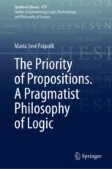Search
Search Results
-
Naturalised Inferentialism and the Incompleteness Problem
The paper argues that the naturalised version of semantic inferentialism advanced by Jaroslav Peregrin faces a problem which, following Michael...
-
Of Marriage and Mathematics: Inferentialism and Social Ontology
The semantic inferentialist account of the social institution of semantic meaning can be naturally extended to account for social ontology. I argue...
-
Pragmatism, Inferentialism, and Expressivism
The Logic of Philosophy presents a development of historical forms of coherence as they are found in discourse and as they can be logically...
-
Lessons from Inferentialism and Invariantism
In this chapter, I explain what is at issue in the debate on the meaning of the logical constants, exposing some weaknesses of the standard way in...
-
Factive inferentialism and the puzzle of model-based explanation
Highly idealized models may serve various epistemic functions, notably explanation, in virtue of representing the world. Inferentialism provides a...
-
Inferentialism, Context-Shifting and Background Assumptions
In this paper I present how the normative inferentialist can make the distinction between sentence meaning and content of the utterance. The...

-
Introduction: Between Inferentialism and Collective Intentionality
Inferentialism and theories of collective intentionality are two important strands in the current philosophical research. Each tradition recognizes...
-
Pragmatism, Expressivism, and Inferentialism in the Logic of Philosophy
My main argument is that reading Weil along pragmatist, expressivist, and inferentialist lines helps to better understand what Weil himself was...
-
How to be a hyper-inferentialist
An “inferentialist” semantic theory for some language L aims to account for the meanings of the sentences of L solely in terms of the inferential...

-
Compositionality, communication, and commitments
In recent years, there has been increasing interest in Rich Meaning Approaches (RMA) that understand the meanings of words as rich conceptual...
-
Meaning, Communal Use and Deference to Experts
It is hardly controversial that laypeople have little-to-no knowledge concerning the actual meaning of such specialist terms as “boson” or...
-
The Practice of Mathematics: Cognitive Resources and Conceptual Content
In the past 10 years, contemporary philosophy of mathematics has seen the development of a trend that conceives mathematics as first and foremost a...

-
Avowals and the project of inferentialism
Whether there are philosophically relevant connections between the expressive role of first-personal vocabulary and self-knowledge is an on-going...
-
Collective Intentionality, Inferentialism and the Capacity for Claim-Making
Some of our linguistic practices are special in that they involve claims about how things stand in the world. These judgments are thought to be true...
-
Inferentialism on Meaning, Content, and Context
In this paper, I show how normative inferentialism could be used to explain several phenomena related to natural languages. First, I show how the...
-
A non-ideal approach to slurs
Philosophers of language are increasingly engaging with derogatory terms or slurs. Only few theorists take such language as a starting point for...
-
The justification of comprehension-based beliefs
What justifies our beliefs about what other people say (henceforth, comprehension-based beliefs )? According to epistemic inferentialism , the...
-
Taming Holism: an Inferentialist Account of Communication
Robert Brandom’s inferentialism notoriously entails meaning holism, which has often been seen as unacceptable because it seems to make communication...
-
Distinctive substantial self-knowledge and the possibility of self-improvement
Quassim Cassam distinguishes between trivial and substantial cases of self-knowledge. At first sight, trivial cases are epistemically distinctive...
